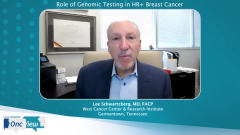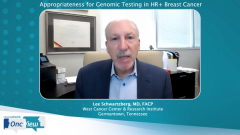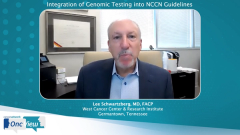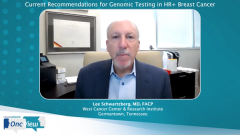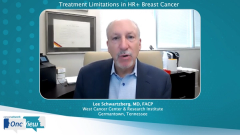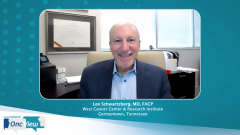
Integration of Genomic Testing into NCCN Guidelines
Dr. Lee Schwartzberg highlights recent changes to the NCCN guidelines in terms of guidance for genomic testing in HR-positive breast cancer based on updates to the RxPONDER trial and data supporting the use of the Breast Cancer Index.
Episodes in this series

Kristie Kahl: How has the NCCN [National Comprehensive Cancer Network] integrated the use of genomic assays into their guideline recommendations for early HR+ [hormone receptor-positive] breast cancer?
Lee Schwartzberg, MD, FACP: The NCCN has expanded their recommendations regarding genomic assays over the last several years. This is a good thing because it reflects the fact that we have so much more information about these genomic assays now than we had just a few years ago. That is based on both prospective trials that have reported over the last several years and have given us a good prospective look at where these assays will have utility. As well as increasing number of what is called retrospective prospective trials where tumor samples from studies that were done years ago are in a blinded fashion tested by a genomic assay and sorted into the risk. And then we can go back and look at it and see what the outcome was in that population. If one has enough tumor samples to mirror the entire population that was treated in a particular study, the retrospective prospective approach is quite accurate as well.
Kristie Kahl: Dr. Schwartzberg, what are the data on which this decision was based on? For example, to add these assays to the guidelines. Why did the guidelines decide to incorporate them?
Lee Schwartzberg, MD, FACP: The first assay that made the guideline was the 21-gene assay since it was one of the first assays to come on the market. And the first to have a lot of information from multiple retrospective prospective trials. But NCCN changed its approach and changed the format. It now has a whole section which is devoted to all the different assays that are available. It reports them whether they are predictive of either a chemotherapy benefit or an endocrine benefit, and whether they are prognostic, and what the level of evidence is. There are now several pages in the guidelines that go into detail about these assays and make it very clear for the user to reference them and to find out how best to utilize them. The most recent data that has come has been the prospective data from the RxPONDER trial for the 21-gene assay in node-positive patients, which has just made it into the guidelines over the last year after that study was presented. Updates of the MINDACT trial which looked at the 70-gene assay in clinically high and clinically with gnomically higher, gnomically low based on the assay and has updated results. And the BCI [Breast Cancer Index] assay, which has now had several data sets that look at the benefit, the predictive value of extended adjuvant endocrine therapy in patients who would be at higher risk. And seeing whether individual patients would benefit or not from extended adjuvant therapy. That update was incorporated into the NCCN guidelines in early 2021. These guidelines have changed quite a bit. If you are looking at an older NCCN guideline before 2020, or even earlier, that will not have the information. I urge everyone to get the most updated version of the guidelines. Everyone knows that the NCCN guidelines are updated quite frequently. We are on version four already of 2021 for breast cancer guidelines at the midpoint in the year. So it reflects that fact that there is a lot of the great data that is coming out, and clinical trials that help inform our decisions on how to help our patients with breast cancer.
Transcript edited for clarity.
Newsletter
Stay up to date on recent advances in the multidisciplinary approach to cancer.


